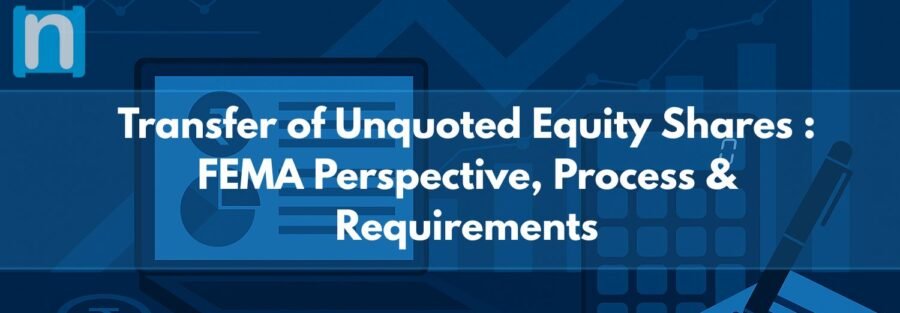Transfer of Unquoted Equity Shares: FEMA Perspective, Process & Requirements
Table of Contents
ToggleWith India becoming a preferred investment destination, startups and private companies frequently deal with the transfer of unquoted equity shares between residents and non-residents. These transactions are not just corporate matters but are governed by the Foreign Exchange Management Act (FEMA), 1999.
Non-compliance with FEMA can lead to penalties, reversal of transactions, and complications in future funding rounds. Therefore, for Founders, CFOs, Company Secretaries, and CAs, understanding FEMA’s role in such transfers is essential.
FEMA Laws Governing Share Transfer
The key legal framework under FEMA is:
FEMA 20(R) – Non-Debt Instruments Rules, 2019:
This regulation governs all transactions involving equity instruments, including:
- Sale of shares by a resident to a non-resident
- Transfer from a non-resident to a resident
- Inbound investments and exit mechanisms
Pricing Guidelines: - Transfers from resident to non-resident: Minimum price = Fair Market Value (FMV)
- Transfers from non-resident to resident: Maximum price = FMV
Valuation must be certified by a: - Chartered Accountant (CA), or
- SEBI-registered Merchant Banker, or
- Practicing Cost Accountant
Methodology must follow internationally accepted pricing norms on an arm’s length basis.
When to File FC-TRS or FC-GPR
| Form | Purpose | Applies When |
|---|---|---|
| FC-GPR | Reporting new issue of shares to a non-resident | Company receives FDI and allots shares |
| FC-TRS | Reporting transfer of shares between resident & non-resident | Sale/purchase between resident and non-resident parties |
Both forms must be filed on the RBI’s FIRMS portal.
Step-by-Step FEMA Reporting Process
Resident to Non-Resident (e.g., Indian Founder exits to foreign VC):
- Obtain Valuation Report
- Execute Share Purchase Agreement (SPA)
- Complete Form SH-4
- Collect KYC & FIRC
- File Form FC-TRS
- Company records share transfer
Non-Resident to Resident:
Similar steps apply, except:
- Pricing should not exceed FMV
- FC-TRS is filed by resident transferee
Timelines, Common Errors & RBI Scrutiny Triggers
| Compliance Element | Timeline |
|---|---|
| Filing of FC-TRS | Within 60 days of transfer[1][9][17] |
| Valuation Report Validity | As on date of transfer (should not be more than 90 days old)[14][18] |
| Stamp Duty on SH-4 | 0.015% of consideration (as per current central law)[15][19] |
| Share Certificate Update | Within 1 month of SH-4 submission[8][12][16] |
Common Mistakes:
- Using book value instead of FMV
- Missing FC-TRS deadline
- Incomplete KYC or incorrect tagging in FIRMS
- Failure to report group company transfers
Scrutiny Triggers by RBI:
- Sudden spike/drop in valuation
- Repeat non-compliance by same entity
- Transfers without inward remittance trace
- Backdated or amended SPAs
Visual Checklist: Transfer of Shares under FEMA
Step-by-Step Compliance Checklist:
- FMV valuation report
- SPA and SH-4 executed
- KYC from AD bank
- FIRC copy
- Filing of FC-TRS within 60 days
- Board resolution & share certificate update
- Statutory registers updated
Practical FAQs
1. Who is responsible for FC-TRS filing?
The resident party must file FC-TRS on FIRMS.
2. What is the penalty for late filing of FC-TRS?
Delay can attract compounding proceedings and penalties under FEMA.
3. Can FMV be lower than the price paid?
For FEMA compliance:
– Resident to Non-resident – price must be ≥ FMV
– Non-resident to Resident – price must be ≤ FMV
4. Is valuation required even for gift transfers?
Yes, valuation is still required even if shares are gifted for reporting purposes.
5. Are ESOP buybacks from non-residents covered?
Yes. These fall under FC-TRS and require FEMA compliance.
How Our Firm Can Help
At N Pahilwani & Associates, we specialize in end-to-end FEMA compliance and valuation advisory for startups and corporates, including:
- Valuation Reports (CA / Registered Valuer Certified)
- FC-TRS / FC-GPR Filing on FIRMS Portal
- End-to-End RBI Compliance
- Transaction Documentation: SPA, SH-4, Board Resolutions
- Advisory on FEMA structuring and compounding (if needed)
Need help with a cross-border transaction? Let’s ensure it’s 100% compliant and audit-ready.
Conclusion
FEMA compliance in the transfer of unquoted equity shares isn’t optional, it’s mission-critical. With increasing scrutiny and digitized tracking via FIRMS, non-compliance can derail funding rounds or draw penalties. Startups, CFOs, and founders must adopt a structured, well-documented process supported by professionals.




